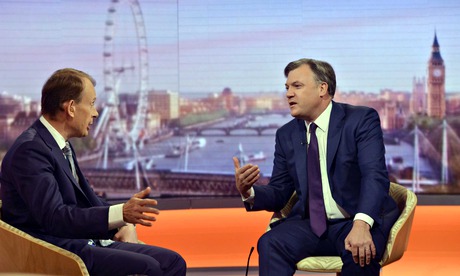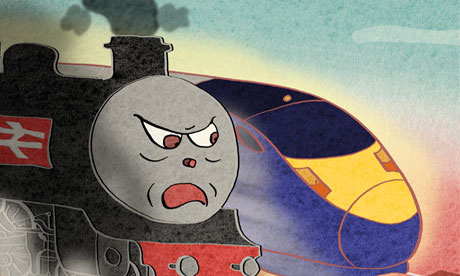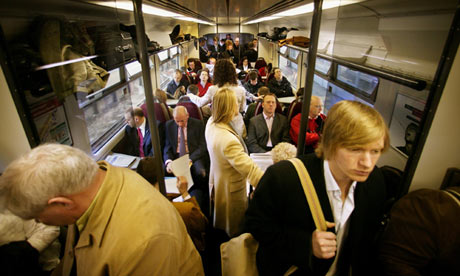Source The Guardian
John McDonnell arrives with his shirt open at the neck. As the photographer sets up, he says: “I must put a tie on. I want to look respectable.” He rummages in his rucksack and draws out a tie of a very conservative deep blue. As he puts it on, the man who once declared his mission to be “generally fermenting the overthrow of capitalism” jokes: “I’m trying to look more like a central banker.”
This fellow veteran of the Bennite left is Jeremy Corbyn’s closest ally in a shadow cabinet that contains very few true friends of the new Labour leader.
The cartoonish version of his shadow chancellor is a belligerent, divisive, leftwing firebrand. He certainly has a history of incendiary rhetoric and he is unquestionably leftwing. He is not humourless and, if he can be abrasive, today he is doing his best to turn his most emollient face to the world.
He acknowledges that many senior Labour MPs were appalled by his appointment and influential trade union figures urged the Labour leader to make a less contentious choice. The rightwing press have raged against him even more than they have about the election of Corbyn himself. “It was a difficult decision for both him and me” and “we knew we were going to get a tsunami hit us.”
He is a man many love to hate. Why is that? He puts it partly down to “swimming against the tide” for all those decades when his brand of leftwing politics was despised and ignored by successive leaders of the Labour party. He reveals that his wife and family had their doubts about whether he should take it on: he had a mild heart attack two years ago. “I had warnings from them: ‘Come on, look, are you sure?’ But it had to be done.”
After many conversations with Corbyn, they concluded that they had to “ride the controversy” because it was essential that leader and shadow chancellor were as one on economic policy. “We didn’t want to go through a Blair–Brown era again where leader and chancellor are falling out all the time or what went on with Ed [Miliband] and Ed Balls. I think Jeremy’s point of view is ‘I’ve got to have someone who I one hundred percent trust.’ ”
The composition of the rest of the shadow cabinet, he argues, shows that they are not being militantly factional and are genuinely interested in having “a really broad-based team” representing all strands of Labour opinion. “As big a tent as we possibly can.” They started making overtures to people before it was announced that Corbyn had won and he is still appealing to some who quit the shadow cabinet for internal exile on the backbenches. He hopes that they will think again and cooperate on the development of policy. “I’m still having that conversation now with people to see if we can get them back into some role. I think we might be able to.”
Like who? “I would like Chuka [Umunna] to come back, desperately.” He mentions some more of those who have refused to serve. “Shabana Mahmood is a brilliant talent for the future. People like that I’d really like to get back. If we could get them back on board it will send a message that we really are a big tent.”
His friend’s debut week as leader has not been a smooth ride. Even sympathisers have been tearing out their hair over an often shambolic first seven days of unforced errors and forced U-turns which gifted a lot of ammunition to their many enemies in both the press and the Labour parliamentary party. McDonnell acknowledges that it has been “a bit rough” and puts the mistakes down to naivety. Whatever mutinous colleagues say to the contrary, he claims to be completely confident that his friend will lead Labour into the 2020 election.
His own appearance on Question Time involved two apologies. Once for saying that he wished he could have assassinated Margaret Thatcher – “an appalling joke”. And again for a notorious speech in which he commended the bravery and sacrifice of the IRA for using their bombs and bullets to bring “Britain to the negotiating table”. Some of the audience applauded his expression of regret. Others have found his explanation for the IRA speech – that he was praising them to try to sustain the peace process – utterly unconvincing. “I set up the all-party group on conflict prevention and conflict resolution. I chaired it,” he says, but acknowledges: “There’ll be some I’ll never convince.” Part of his problem with presenting himself as one of nature’s peacemakers is that he has a lot of form when it comes to suggesting political opponents should meet violent ends, talking about “lynching the bastard” in reference to the Tory Esther McVey and having “a recurring dream about garrotting Danny Alexander”.
He smiles: “I know.”
Where is that coming from? Liverpool, is his answer. “I’m from the north. You can take the boy out of the north but you can’t take the north out of the boy. I’m a plain speaker.”
Does the mellow version of McDonnell extend to having anything pleasant to say about the man he now shadows, George Osborne? “I’ve tried to get to a situation where you mature, where you don’t personalise your politics. But I go back to my constituency and you should come to my surgery some time, you’d sit down and weep. I have people begging me for a house. I’ve got families living in beds in sheds. Shanty places. So I think Osborne is cut off from the real world. I’m going to challenge him to come down to see them. What angers me is that they don’t have any understanding of the consequences of what they’re doing.”
This promises lively fireworks ahead when he clashes with a Tory chancellor he calls “immoral”. But to opponents within his own party, the message is relentless conciliation. A manifesto he wrote three years ago called for a tax raid on the wealthiest 10%, banning companies from paying their chief executives any more than 20 times the lowest wage, and a new top rate of tax set at 60%. But he says he is not going to dogmatically impose his ideas. What he will instead announce is policy commissions to investigate various areas and he hopes for participation from a wide range of opinion not just confined to the Labour party.
He wants to change the Bank of England’s target so that it considers not just inflation when setting interest rates, but also the effect on jobs, investment and inequality. One of his biggest and most hotly contested ideas is forcing the bank to print money to fund infrastructure projects: so-called “people’s quantitative easing”. The governor of the bank, Mark Carney, has suggested that this would so compromise its independence that he could not remain as its governor. Rather than upbraid Carney for straying into political partisanship, McDonnell mildly responds that he is “going to try to meet him as soon as possible”.
For the first time in many decades, Labour has a shadow chancellor committed to the nationalisation of some strategic industries. Polls suggest that taking the railways back into state control is popular with a majority. He is likely also to strike a chord when he describes the recent sales of shares in chunks of the Royal Mail and Royal Bank of Scotland as “complete rip-offs” that have left the taxpayer seriously short-changed.
What is perhaps most interesting in terms of his personal ideological development and the way in which debate has shifted over the decades is that he no longer advocates, as the left did back in the 1980s, a return to nationalisation across the board. BT was once a state company. Would he seek to bring it back into public ownership again? “Too late,” he says. “Love to but too late.”
Lack of voter faith in Labour’s economic competence lay at the heart of the party’s defeat back in May as it also did when they were thrown out of office in 2010. If the public did not trust Gordon Brown and Alistair Darling with the economy, nor Ed Miliband and Ed Balls, why are they going to trust Jeremy Corbyn and John McDonnell?
“They’re not going to have to trust me or Jeremy Corbyn or whatever. They’re going to have to trust the Labour party.”
He says he wants the membership, which grew during the leadership contest and has drawn in more Corbyn enthusiasts since the result, to get involved in policy making. This also hints at how he and Corbyn think they can mobilise support in the party as a counterweight to the hostility of the great majority of Labour MPs.
“We’ll go on the stump immediately after the party conference, get as many members out there as possible, in the same way that Jeremy went on the stump before. But the difference now will be not urging people to vote for us, it’ll be about urging people to get involved in the discussion. I think Labour MPs will be shocked at the way in which they will be engaged in a democratic process of determining our policies.”
His admirers say McDonnell is a serious thinker about a radically different way of approaching the economy. Asked which writers have most influenced him, he rattles off several names of contemporary, leftwing economists, but at the top of his list he places Karl Marx. ‘You can’t understand the capitalist system without reading Das Kapital. Full stop.’
He says this with a knowing twinkle. That is not an answer you would have got from any previous Labour shadow chancellor in living memory. Nor from any central banker.










